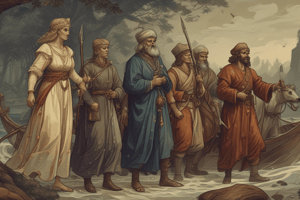Podcast
Questions and Answers
What is the role of a historian in interpreting historical facts?
What is the role of a historian in interpreting historical facts?
- To give meaning to facts and organize them into a coherent narrative (correct)
- To memorize and recite historical dates
- To verify evidence through collaboration with others
- To simply state the facts without interpretation
Which of the following is considered a primary source?
Which of the following is considered a primary source?
- An article analyzing a historical period
- A textbook discussing historical events
- Eyewitness accounts from an event (correct)
- A biography written about a historical figure
What is external criticism in historical research?
What is external criticism in historical research?
- Comparing different historians' interpretations of events
- Analyzing the themes within historical narratives
- Evaluating the content for its truthfulness
- Verifying the authenticity of the evidence based on its physical characteristics (correct)
What was the outcome related to the Code of Kalantiaw?
What was the outcome related to the Code of Kalantiaw?
What does internal criticism examine in historical sources?
What does internal criticism examine in historical sources?
What claim about Ferdinand Marcos was disproven by historians?
What claim about Ferdinand Marcos was disproven by historians?
Which aspect of colonialism should historians criticize according to the content?
Which aspect of colonialism should historians criticize according to the content?
What is a characteristic of secondary sources?
What is a characteristic of secondary sources?
What is the definition of history?
What is the definition of history?
Which statement best supports the idea that 'No document, no history'?
Which statement best supports the idea that 'No document, no history'?
What is historiography?
What is historiography?
Which of the following is a valid historical document?
Which of the following is a valid historical document?
What does the school of thought known as positivism emphasize?
What does the school of thought known as positivism emphasize?
What issue does the restriction of historical evidence highlight?
What issue does the restriction of historical evidence highlight?
Which period did the school of thought called post-colonialism emerge?
Which period did the school of thought called post-colonialism emerge?
Which of the following best describes the main focus of historians in the positivist school of thought?
Which of the following best describes the main focus of historians in the positivist school of thought?
Flashcards are hidden until you start studying
Study Notes
Definition of History
- Originates from the Greek word "historia," meaning "knowledge gained through inquiry or investigation."
- Encompasses the study of past events, especially the experiences of societies.
- Relies on written documents and historical evidence to recount people's pasts.
- Major themes include wars, revolutions, and significant breakthroughs.
No Document, No History
- Historical events must be supported by written documentation to be considered factual.
Valid Historical Documents
- Govern records, chronicles, personal letters, receipts, and other written materials serve as credible historical evidence.
Discrimination in the Validity of History
- Defining valid historical evidence solely as written is discriminatory toward marginalized social classes.
- Many societies lost their historical documents due to war or colonization.
Historiography
- Refers to the study of how history is written and understood.
- Involves examining the context, authorship, and methodologies behind historical texts.
Positivism
- Developed in the 18th-19th century, emphasizing the need for empirical, observable evidence to support historical claims.
- Historians must present primary documents to construct historical narratives.
Post-Colonialism
- Emerged in the early 20th century as formerly colonized nations sought to reclaim their identities and historical narratives.
- Focuses on writing national histories that emphasize independence from colonial perspectives and critiques of colonialism.
History and the Historian
- Historians must interpret facts and evidence, organizing them into coherent timelines and understanding causal relationships.
- Involves specific methodologies and rules for analyzing historical sources effectively.
Historical Sources
- Classified as primary and secondary sources:
- Primary Sources: Created during the event studied, e.g., minutes, photographs, eyewitness accounts.
- Secondary Sources: Produced using primary sources, e.g., textbooks, articles, biographies.
- Historians utilize two main evaluative techniques:
- External Criticism: Verifying the authenticity of evidence through physical characteristics and historical context.
- Internal Criticism: Assessing the truthfulness of evidence by examining the source's content and circumstances of its creation.
Deception Cases in Philippine History
- Hoax Code of Kalantiaw: Once deemed an important precolonial document, its authenticity was debunked by historian William Henry Scott due to lack of evidence.
- Ferdinand Marcos's WWII Soldier Claim: Initially accepted history disproven when historical research revealed inconsistencies with U.S. war records.
Studying That Suits You
Use AI to generate personalized quizzes and flashcards to suit your learning preferences.




